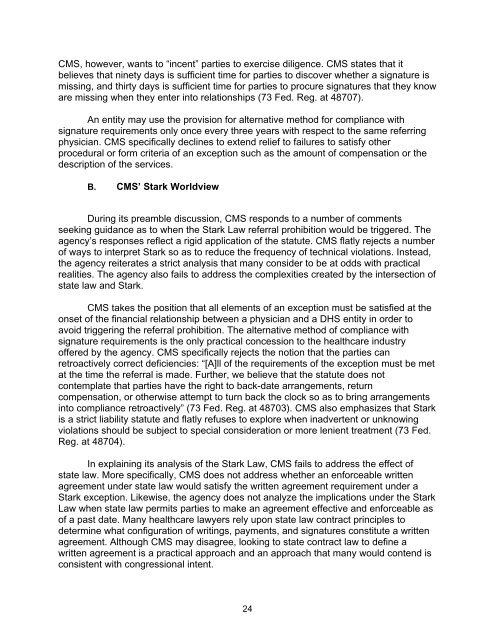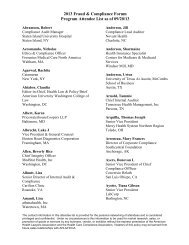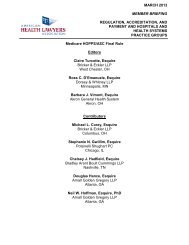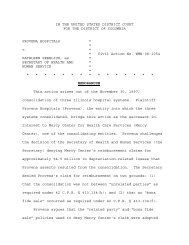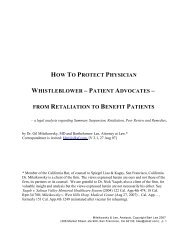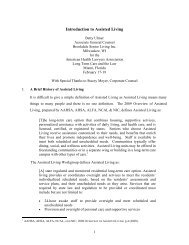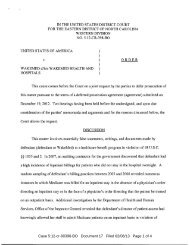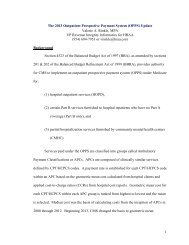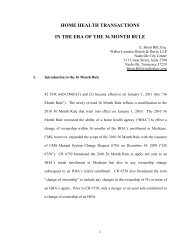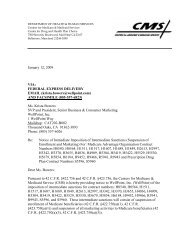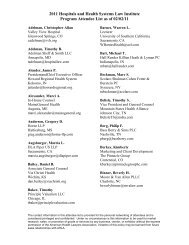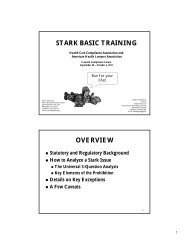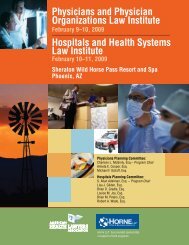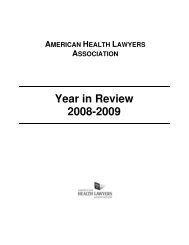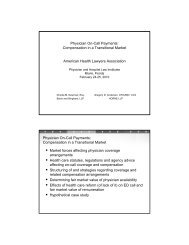The 2009 IPPS Final Rule - American Health Lawyers Association
The 2009 IPPS Final Rule - American Health Lawyers Association
The 2009 IPPS Final Rule - American Health Lawyers Association
You also want an ePaper? Increase the reach of your titles
YUMPU automatically turns print PDFs into web optimized ePapers that Google loves.
CMS, however, wants to “incent” parties to exercise diligence. CMS states that it<br />
believes that ninety days is sufficient time for parties to discover whether a signature is<br />
missing, and thirty days is sufficient time for parties to procure signatures that they know<br />
are missing when they enter into relationships (73 Fed. Reg. at 48707).<br />
An entity may use the provision for alternative method for compliance with<br />
signature requirements only once every three years with respect to the same referring<br />
physician. CMS specifically declines to extend relief to failures to satisfy other<br />
procedural or form criteria of an exception such as the amount of compensation or the<br />
description of the services.<br />
B. CMS’ Stark Worldview<br />
During its preamble discussion, CMS responds to a number of comments<br />
seeking guidance as to when the Stark Law referral prohibition would be triggered. <strong>The</strong><br />
agency’s responses reflect a rigid application of the statute. CMS flatly rejects a number<br />
of ways to interpret Stark so as to reduce the frequency of technical violations. Instead,<br />
the agency reiterates a strict analysis that many consider to be at odds with practical<br />
realities. <strong>The</strong> agency also fails to address the complexities created by the intersection of<br />
state law and Stark.<br />
CMS takes the position that all elements of an exception must be satisfied at the<br />
onset of the financial relationship between a physician and a DHS entity in order to<br />
avoid triggering the referral prohibition. <strong>The</strong> alternative method of compliance with<br />
signature requirements is the only practical concession to the healthcare industry<br />
offered by the agency. CMS specifically rejects the notion that the parties can<br />
retroactively correct deficiencies: “[A]ll of the requirements of the exception must be met<br />
at the time the referral is made. Further, we believe that the statute does not<br />
contemplate that parties have the right to back-date arrangements, return<br />
compensation, or otherwise attempt to turn back the clock so as to bring arrangements<br />
into compliance retroactively” (73 Fed. Reg. at 48703). CMS also emphasizes that Stark<br />
is a strict liability statute and flatly refuses to explore when inadvertent or unknowing<br />
violations should be subject to special consideration or more lenient treatment (73 Fed.<br />
Reg. at 48704).<br />
In explaining its analysis of the Stark Law, CMS fails to address the effect of<br />
state law. More specifically, CMS does not address whether an enforceable written<br />
agreement under state law would satisfy the written agreement requirement under a<br />
Stark exception. Likewise, the agency does not analyze the implications under the Stark<br />
Law when state law permits parties to make an agreement effective and enforceable as<br />
of a past date. Many healthcare lawyers rely upon state law contract principles to<br />
determine what configuration of writings, payments, and signatures constitute a written<br />
agreement. Although CMS may disagree, looking to state contract law to define a<br />
written agreement is a practical approach and an approach that many would contend is<br />
consistent with congressional intent.<br />
24


